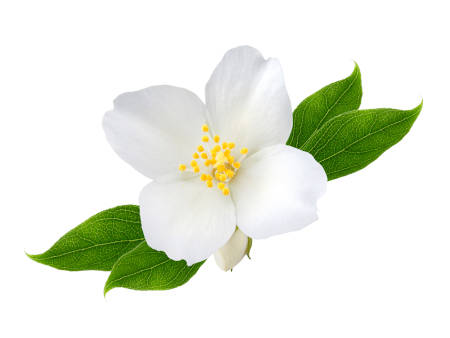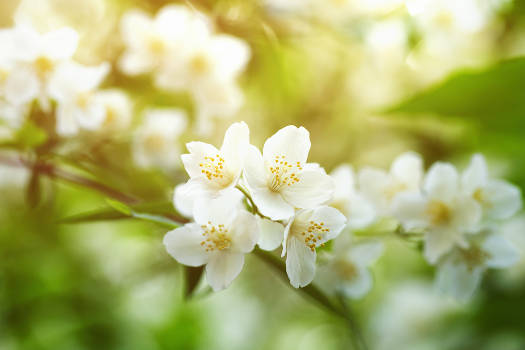Jasmine’s (Jasminum officinale) sensual, subtly musky floral fragrance has captivated people for millennia. The distinctive flowers might be small, but they pack an olfactory and magical punch.
For as long as humans have been cultivating this plant, it’s been associated with a very interesting set of magical abilities.
Magical Properties of Jasmine
Jasmine is best known as an herb for love and sensuality. When included in love jars, bottles, sachets, and other formulas, it tends to produce relationships that are closer to intense flings than long-term, chaste devotion.
Some sources tend to dispute this, and claim that jasmine produces a spiritually pure love. For this reason, it’s best used in combination with other love herbs if you want a balanced relationship.
This plant is also sometimes used for relaxation and meditation. When burned in a bedroom before retiring for the night, its said to produce prophetic dreams. Jasmine tea is also used for divination.
Jasmine is ruled by the Moon and the element of water.
Benefits & Uses of Jasmine
Jasmine contains a wide variety of compounds called polyphenols. These are potent antioxidants, which help protect cells from oxidative damage.
Emodine, a phytochemical in jasmine, may help lower blood sugar.
Jasmine has mild sedative effects. Its essential oil has been shown to relieve headaches, induce relaxation, and reduce stress levels.

Unfortunately, most jasmine-scented products on the market are made with synthetics. Jasmine flowers yield a very small quantity of fragrance, making it incredibly expensive in essential oil form.
One study involving rats found that jasmine helps lower serum progesterone. This could make it useful for people with endocrine imbalances.
The flowers contain antibacterial, antiviral, and antifungal compounds. Traditionally, it has been used as a wound wash, remedy for intestinal parasites, and treatment for hormonal problems.
Possible Risks & Side Effects of Jasmine
Jasmine allergies are possible. These can be mild to severe, and may manifest as anything from rashes, to intestinal discomfort, to anaphylaxis. If you are allergic to members of the jasmine family, please use another herb in its place.
For love spells, you may wish to use rose petals. For divination, mugwort might be a suitable choice.
One of the constituents of jasmine oil is benzyl acetate. This is a known sensitizer, which means that it may cause people to develop allergies if used at a high concentration or for prolonged periods of time.
Allergies aside, jasmine is a remarkably safe herb. When consumed in the amounts you’d use in food, there are no side effects for most people.
Because of jasmine’s endocrine effects, it should be avoided by those who are pregnant or breastfeeding. There is some concern that people who have balanced hormone levels may trigger an imbalance by consuming large amounts of jasmine.
Jasmine History & Folklore
Jasmine’s history of cultivation is so ancient, nobody’s exactly sure of where it comes from. In Persian, the name means “fragrance.” It’s the national flower of Pakistan. The plant most likely became known to European gardeners via Sicily.
According to one account, an Italian gardener received a jasmine plant from a Persian trader. He never let anyone cut the flowers from this fragrant plant — until he was ready to present a branch to his beloved. She was so taken with the perfume of the jasmine that she agreed to marry him.
In China, jasmine is combined with white or green tea. There are also flowering teas made of tied bundles of tea leaves with a closed bud of jasmine in the center. When these bundles are placed in hot water, they expand and seem to bloom before the drinker’s eyes.
Getting Started With Jasmine
Though jasmine is native to tropical areas, it’s not terribly difficult to grow in temperate places. The plant is hardy in zones 7 through 10, enjoys warm spots, and can thrive in full sun to partial shade.
Regular garden soil is fine as long as it’s kept moderately moist and fertile. If you live in an area that’s too cold for jasmine, you can grow it indoors.
In either case, these plants are prolific growers — vining varieties will need some support, and all types should be pruned and pinched to keep them growing well.
The easiest way to get started with jasmine is by using the dried flowers. Jasmine oil is outrageously expensive, to the point where most scents on the market may not contain any actual jasmine at all.

Try brewing a nice jasmine tea before divining. Steep the tea leaves and flowers in hot — but not quite boiling — water, and stir it with a spoon held in your dominant hand.
As you do this, picture the tea filling with divinatory power. Whisper to the flowers, asking them to aid your psychic abilities. When the tea is ready, sip it slowly as you ready yourself for scrying, tarot reading, or any other form of divination.
If you wish, you can also make some jasmine tea to share with a lover. In this case, visualize the tea filling with passionate vibrations as you stir it, and ask the flowers to rouse feelings of love and sensuality in you and your partner.
You can also place dried jasmine flowers in a dream pillow. Though they don’t have much scent after drying, they still contain all of the magical power of fully-scented fresh jasmine.
Stuff a pillow with dried jasmine flowers, lavender buds, mugwort, and any other dream herbs you desire. Before going to sleep, squeeze the pillow and inhale the scent. Set an intention to experience a prophetic dream. As soon as you awaken, write down anything you saw in your sleep.
As an alternative, grow jasmine outside of your bedroom window. The flowers’ fragrance peaks at night, so you’ll be able to smell it and experience its divination- and dream-enhancing powers before going to sleep.
Jasmine’s origins are shrouded in mystery. While there are many theories as to how these richly-scented flowers made their way around the world, nobody really knows for certain.
We do know that there’s no mistaking their sweet, sensual fragrance — powerful enough to stir the passions, but gentle enough to calm, relax, and awaken your psychic abilities.
